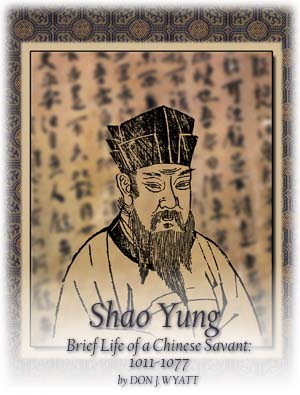
Main Menu ·
Search ·Current
Issue ·Contact ·Archives
·Centennial ·Letters
to the Editor ·FAQs


Of the major figures who resurrected Confucianism and promoted its resurgence
in late eleventh-century China, the philosopher Shao Yung was the most paradoxical.
Committed as he was to reasserting Confucianism's dominance after six centuries
of eclipse by Buddhism, he nonetheless flaunted his intellectual independence
from his fellow revivalists. He was the only prominent thinker of his generation
to spurn the most respected vocation of his class-employment as a government
official. Still, every quarter of Sung officialdom mourned him in death.
Little wonder then that his admirer Ch'eng Hao plaintively immortalized
him as "outwardly a king and inwardly a sage" and "a tower
in empty space."
Family tradition partially accounts for Shao Yung's unconformable nature.
His great-grandfather had aided in the military installation of the founding
Sung emperor in 960, but subsequent Shao patriarchs pursued retiring careers
as scholars. This tradition culminated in Shao Yung. He avoided the state-sponsored
civil service examinations and, like certain latter-day Taoist ascetics
he much admired, remained aloof from, yet keenly aware of, political affairs.
He became a facile and prolific poet, excelling at a pursuit little indulged
in by his philosopher peers. Indeed, his only defenses of his personal aversion
to office are contained in his poetry. "If in life people assumed no
duties that furrowed their brows," he once wrote, "then nobody
in the world would have to grind his teeth in anger."
Yet Shao regarded philosophical inquiry into the mysteries of the universe,
not poetic composition, as his principal calling. By 1062, the year after
declining a summons from the emperor to hold office, he had begun the philosophical
work-the Book of Supreme World-ordering Principles-for which he is best
remembered. Its completion consumed the remainder of the decade. In this
work, Shao addressed classical Confucianism's chief deficiencies in its
competition with Buddhism for the allegiance of the literati. To counter
the Buddhist theory of the illusory character of the universe, Shao offered
a cosmology accounting for all of the processes of nature, from the growth
of grasses to the duration of the universe itself. Buddhists, who believed
in an insubstantial world, were, in his words, "mired in emptiness
always." Shao challenged what he saw as the escapist appeal of Buddhist
promises of salvation after death. Instead, he encouraged scholars to use
the inherited Confucian tradition for enlightened self-cultivation in the
present.
Inclusive as Shao's system was, however, it was too mechanical and deterministic
to be universally accepted. Only his rise as a moral exemplar can fully
explain his fame. In 1069, shortly after he had refused his second and last
imperial summons, Loyang-the secondary Sung capital where Shao lived-began
to attract many of the office-holders who were resigning to protest the
radical reforms of the new prime minister, Wang An-shih. Although moved
by their frustration, Shao urged these bureaucrats, for the sake of the
common people, not to quit their posts. At the same time, he made no secret
of the immense joy he derived from his association with these disaffected
and often eminent statesmen. The most celebrated of his new friendships
was with Wang's bitter opponent and eventual successor, Ssu-ma Kuang.
Shao benefited from the conservative Loyang faction's generosity. In 1074,
Ssu-ma and a few others purchased an extensive property for him that included
the beloved house in which he would die. Shao, in return, provided these
once-powerful political exiles with a constant stream of hospitality, wine,
and good cheer. He also supplied the profundities. In the summer of 1077,
bedridden by recurrent pains in his limbs, he addressed, one by one, the
gentlemen who, along with his two sons, attended his death watch. Turning
to the headstrong Ch'eng I, his philosophical rival and successor, whose
ideas would determine the dominant direction of the movement he had helped
to spark, Shao raised and displayed both his hands. When the younger man,
impatient and confused, asked what he meant, Shao said, "The road before
you must be made broad. If it is narrow, there will be no room even for
yourself. How much the less can you then lead others to walk upon it?"
Shao Yung's reputation as untainted by the world had more than compensated
for his lifelong refusal of employment and other eccentricities. He had
emerged, in a cynical and competitive age, as a paragon of tolerance and
congeniality. Hypocrisy in the interest of winning power was commonplace.
But Shao, by remaining loyal foremost to his own intuitive sense of upright
conduct, had succeeded in opposing this trend by his example. Thus, he had
shown all would-be political leaders that the greatest gift of friendship
is authenticity. Adherence to inner virtue, not conformity with the normative
expectations of others, had forever defined him as a model for the Neo-Confucian
moral man.
Don J. Wyatt, Ph.D. '84, is professor of history, vice president
for undergraduate affairs, and dean of Middlebury College. His The Recluse
of Loyang: Shao Yung and the Moral Evolution of Early Sung Thought will
be published in September by the University of Hawai'i Press.
Photomontage based on an anonymous hagiographic portrait of Shao Yung. The
original image comes from Portraits and Eulogies of Historical Figures,
a late fifteenth-century Ming woodcut album .
Main
Menu ·Current Issue
·Contact ·Archives
·Centennial ·Letters
to the Editor ·FAQs
